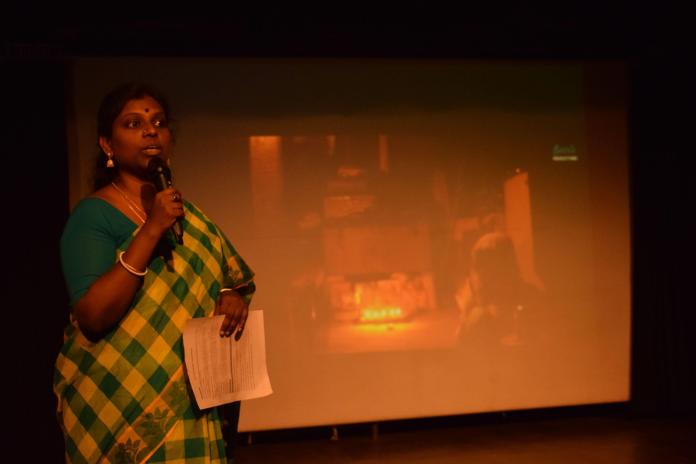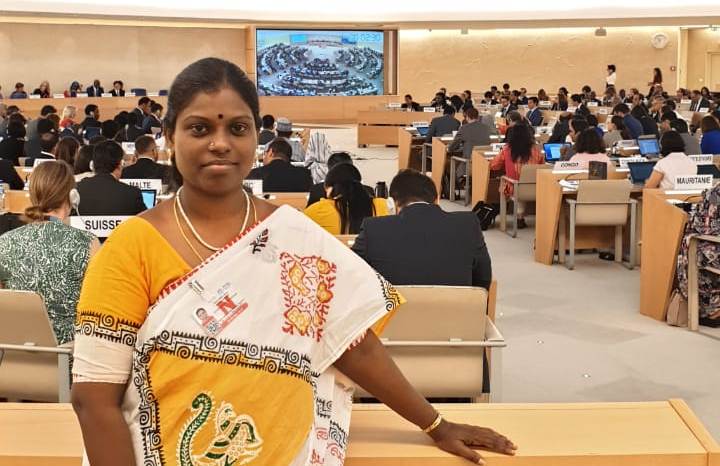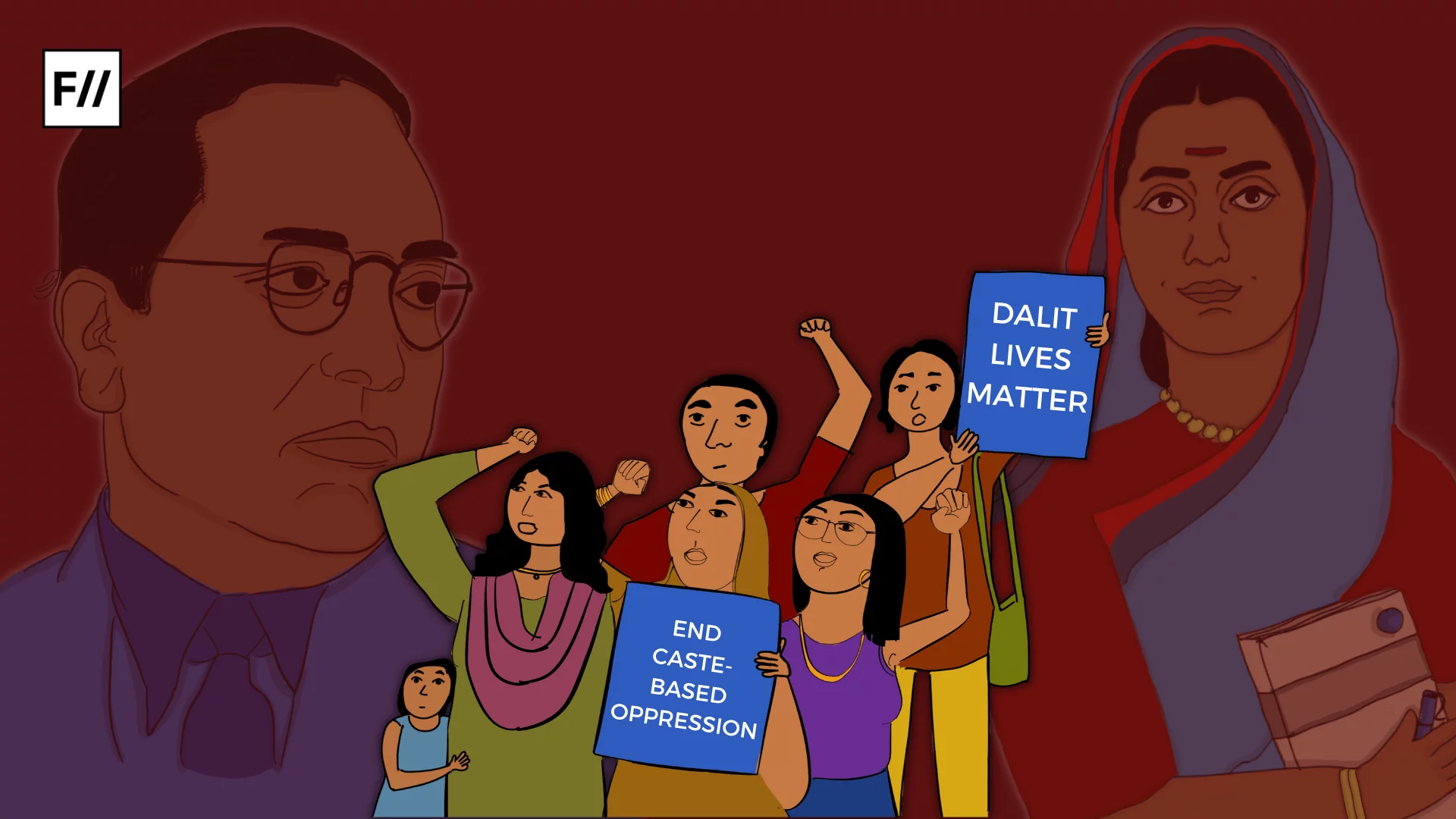Abirami Jotheeswaran is a human rights defender and the National Program Coordinator of the National Campaign on Dalit Human Rights NCDHR. Most recently, she was part of a fact-finding team in Mirchpur to investigate a case of caste-based violence.
FII’s Anagha Smrithi got an opportunity to interview Abirami Jotheeswaran to talk about her work, interests, and life.
Anagha Smrithi: Can you describe your journey towards becoming the National Program Coordinator of the NCDHR?
Abirami Jotheeswaran: Residing in Chennai, I experienced many forms of caste-discrimination throughout my lifetime. A striking incident was during my graduation, when a classmate asked me what caste I belonged to in front of all my other classmates. The question was irrelevant, more so because she was aware of my social background as she knew my family. I felt insulted in front of my classmates and realised that caste certainly exists in urban cities like Chennai. After my Masters in Computer Science, I got married and settled in Delhi. A few years later, I got the opportunity to sit for an interview with the NCDHR. Even though I didn’t have a social work or human rights background, as someone who witnessed caste discrimination during my college days, I excelled in the group discussion and interview about caste-based discrimination.

NCDHR changed me as a Dalit Human Rights Defender. When I joined as a Monitoring Associate in 2005, the work was new to me and I learnt everything through trial and error. I had to work hard to improve my Hindi to be able to coordinate with the State Coordinators of Northern states. I also equipped myself with legal knowledge of various legislatures surrounding the question of Dalit human rights. I used to work more than 10 hours a day, sometimes even carrying home documents to meet my deadlines. At the same time, I was also a mother. But I persisted at work so that I could be on par with my colleagues, most of whom were men.
my primary responsibilities are to keep track of human rights violations, torture and ill-treatment of Dalits, and to provide legal assistance to the victims and survivors of caste atrocities
The 14 years I have been associated with the NCDHR has deepened my understanding of caste, violence, human rights and Dalit perspectives and ideologies. Today I am the National Program Coordinator and my primary responsibilities are to keep track of human rights violations, torture and ill-treatment of Dalits, and to provide legal assistance to the victims and survivors of caste atrocities across 12 States in India.
As a National Program Coordinator, I have participated in conferences and consultations at the State, National and International level to highlight Dalit human right violations in India, and to hold the state accountable. Right now I visiting Geneva to address the UN about issues faced by Dalit Women. My 14 years with NCDHR has taught me the importance of struggling for justice in the courtroom. Because of this, I decided to pursue my higher studies in law. Most importantly, my association with NCDHR built my Dalit ideology and my strength as a leader to deepen the struggle against the caste system.
Anagha Smrithi: You were part of a fact-finding team about caste atrocities in Haryana. How did you obtain facts when the information was hidden/ fudged by the police and administration?
Abirami Jotheeswaran: On 24 April 2010, the National Dalit Movement for Justice (NDMJ) of National Campaign on Dalit Human Rights (NCDHR) and Anhad facilitated a national fact-finding visit to Mirchpur in Haryana’s Hisar district, where a dominant-caste mob had attacked Dalits in the village. The team consisted of a diverse group of people of journalists, activists, publishers and human rights defenders, including myself. The NDMJ Haryana state team visited the site of violence the day after the incident took place. They identified active victims, witnesses and built trust and a relationship with them. During our fact-finding process, we held detailed interviews with the victims—this was crucial in obtaining information that the police otherwise would not reveal.
Also read: #DalitHistoryMonth2019 Event: An Evening Of Remembrance, Resistance And Resilience
Through the interviews we gained information about the social background of the victims, the occurrence of previous atrocities in the same village and the events leading up to the incident. We discovered how the mob had planned to commit the offence, which differed from the police claim that it was a spontaneous conflict. We surveyed the loss of property and investigated the collusion of the police, administration and the Khap panchayat in committing the crime and obstructing justice.
Anagha Smrithi: Was any action taken after the fact-finding report?
Abirami Jotheeswaran: Soon after the fact-finding report, the NDMJ conducted a press conference to give visibility to the caste and build pressure on the government. We demanded appropriate sections of the SC & ST act be invoked for the immediate arrest of all those involved in the violence, along with resettling the affected Dalits in a secure place. We strove to register cases against the police and administration for the negligence of official duty, and demanded employment to all the members of the affected families, as well as a proper estimation of the damage inflicted upon the families.

At the state level, we participated in protests, approached the Human Rights Law Network for legal interventions and took up advocacy with the Minister of Social Justice and other state authorities to ensure immediate arrest, complete investigation, the submission of a charge sheet, relief and rehabilitation for the affected and protection for the involved witnesses. As of today, we are still consistently engaging with the legal system and following up with the victims to achieve justice.
Anagha Smrithi: How can swifter justice be ensured in such situations where the SC/ST Act is not implemented properly? Can the media and civil society play a role?
Abirami Jotheeswaran: Civil Society and national media can definitely play a critical role in lending visibility to caste-based atrocities. Civil Society Organisations can accompany victims during their meetings with officials. This builds pressure on the officials and increases the confidence of the victims to place their demands without fear. They can collaborate with the administration to provide immediate compensation to the victims as per the rules of the SC/ST Prevention of Atrocities Act.
Soon after the fact-finding report, the NDMJ conducted a press conference to give visibility to the caste and build pressure on the government.
In the case of the Mirchpur carnage, for instance, it was through the pressure of Civil Society Organisations and the media that the Police SHO was arrested for his dereliction of duty. Similarly, the quick intervention by the Supreme Court was also made possible through the intervention of the CSOs. This was the first instance of mass violence against Dalits in Haryana that actually culminated in a proper conviction. The role of the media was notable in this, as they spread awareness to Non-Dalits about the violence that had been committed.
Anagha Smrithi: Even in cases of cruel atrocities & oppression, there is often still resistance and assertion from the community. What sort of resistance did you observe during your fact-finding process?
Abirami Jotheeswaran: Before the incident, violence had taken place against Dalits, but no proper action was taken by the police administration. But when this carnage happened, the Dalit community lost 2 lives and immeasurable damage to the property and possessions. Despite the losses, they unanimously decided to fight for justice and not tolerate any more violence by the dominant caste. They left their houses in Mirchpur and moved towards Mini Secretariat, demanding for justice. Their journey took them to Delhi, and finally to a farmhouse in Tanwar, protesting for justice, security, rehabilitation and jobs all the way. The State Government, faced with renewed pressure finally took action against the accused and the negligent administration. Though the victims continue to live away from their homes, in difficult conditions, the spirit of resistance is still alive.
Also read: “All Romantic Experiences Are Essentially Caste Experiences”: In Conversation With Jyotsna Siddharth
FII thanks Abirami Jotheeswaran for taking time out to do the interview.
Featured Image Credit: Abirami Jotheeswaran
About the author(s)
Anagha is pursuing her MA in Media & Culture from TISS Mumbai.




